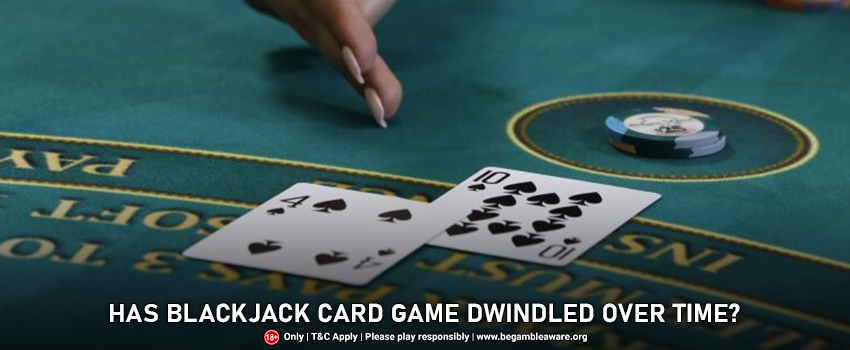From the day when Ed Thorp's book Beat the Dealer got published in 1962, and included the initial card counting strategy, blackjack has been the preferred casino game for savvy and clever players everywhere. When it comes to table game components and income in Nevada in 1985, blackjack made up a good chunk of those in play and a good portion of those in income.
Intellects, pro players, mathematicians, and gamblers liked this card game since it offers a genuine opportunity to defeat the house. It was unknown for a long time before becoming prominent, and now its popularity has waned. When it comes to products, what counts most is what people can accomplish with them and not the product itself. Blackjack is an excellent illustration of this. It began in France, as did several other casino gaming activities (such as poker), however it was given its current shape by Americans.
The Rise of Blackjack’s Popularity

Blackjack's appeal stemmed in part from the fact that certain players enjoy making judgements and having some influence over the result. Most of blackjack's appeal stemmed from the perception that it was a winnable game, as well as the perception that it was a level playing field.
Over the course of the last two centuries, blackjack has been compared as a bench-warmer for casinos. Craps, a raucous, sociable pastime portrayed at its most colourful in Guys and Dolls, was by far the most prevalent game in Vegas until the 1950s. For those who were lucky, craps might be a celebration; and when it was a painful experience, it was for all. Whereas blackjack pits the players against the dealer. It is possible that a new player who diverges from fundamental strategy by hitting instead of standing will be called out for "grabbing the dealer's 10."
The truth is that the majority of blackjack players do not even use ideal fundamental technique; additionally, only a small percentage of players understand strategies and counting cards, and considerably fewer people do well enough to defeat the game. However, the notion that any player can go into a land-based place and defeat a card game that isn't meant to be winnable. That too in a setting where the player isn't expected to win – is fascinating, and has kept the blackjack business alive for the last 50 or so years.
What made blackjack stand out among casino games?
While counting cards is an option, blackjack has historically been the fairest game of chance in the casino, with house odds under ideal general strategy often being in the region of 0.50 percent. This has resulted in blackjack being the game of choice for savvy gamblers all around the world, even before legalised and regulated gambling became widespread.
Blackjack has reigned supreme at the casino tables for centuries. After the movie 21, which was modelled on the true account of the MIT team, brought counting to a broader audience, the game saw a resurgence. However, hardly anything lasts a lifetime, and on the Vegas Strip in particular, baccarat has recently overtaken blackjack as the game of choice among many big rollers.

What exactly transpired with respect to due time?
Many factors were responsible for the deterioration in blackjack's popularity. Blackjack isn't just suffering due to increased rivalry from roulette, video slots, baccarat and other casino games.
- To begin, the dealer's behaviour when dealing a soft 17 was changed by the regulations. Conventionally, the dealer would take a stand on soft 17. The house advantage increased by 0.2 percent after the rules were changed to allow the dealer to draw an extra card on soft 17. At first, it may not seem like a lot, but it usually amounts, especially in a game where the advantage was almost nil.
- Numerous casino management, unhappy with the game's upside prospective for gamers, have chipped away at the player's advantage now and again in an attempt to increase the game's profitability.
- Since the casino has no need to provide players with a game they can statistically beat, they have gone to great lengths to minimise any danger from counters in particular. The first major development was the extensive use of CSMs, which not only accelerates the gameplay but also removes card counting. Pair-splitting restrictions, multi-deck variants, and automated shufflers were further very minor changes to the regulations in the casino's favour that were intended to boost profits in the brief term, although in the long run, they pushed away many patrons.
In the meantime, the casinos have progressively (and probably inadvertently) removed any motivation to master a sophisticated fundamental strategy for a casino game that is no more easy to beat. Also, in a growing number of instances, it does not even provide a better house edge than titles that need no skill at all.
Summary
However, it's not all doom and gloom for the casino's most basic card game. Paradoxically, due to contemporary technology, the old table and card game of blackjack is once more on the upswing. Following the lead of their land-based counterparts, online casinos have maintained the highest hand payouts at 3:2. Because players may pick and choose whatever rules to employ, they are not bound by the house's deck count and splitting restrictions. Individuals have the option of playing with 2, 4, 6 or 8 decks, based on how many cards they wish to count or how many higher-value cards they like to have accessible.
Are the real-life gambling establishments going to take a cue from their online counterparts' successes? This remains to be seen. Blackjack, on the other hand, appears to still have enough of life in it considering the obstacles it has encountered along the road. To put it another way, we all want to believe that we have a chance of beating the house!

